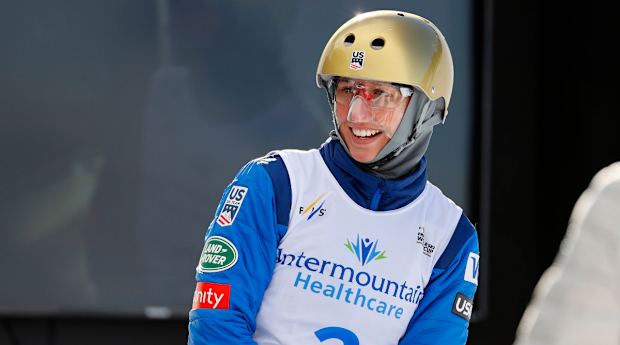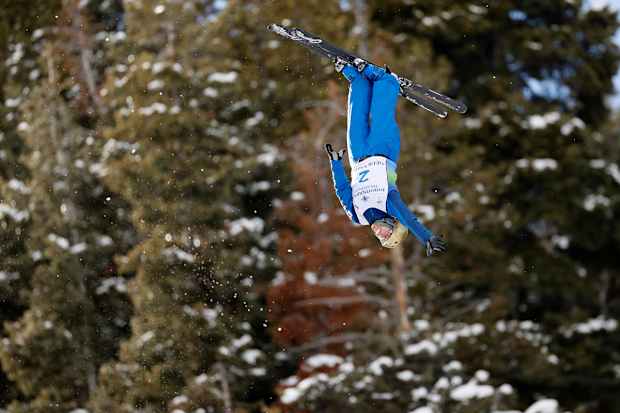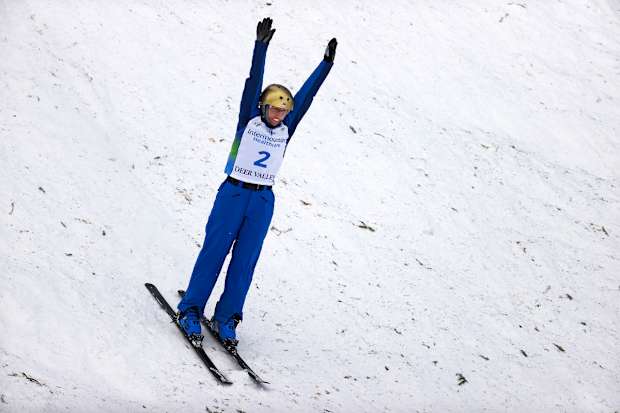The loss at age 10 forever changed the now 23-year-old U.S. aerial skier, whose competing in the Olympics is just another feat on a long list of athletic and personal achievements.
BEIJING — When she was 10 years old, Winter Vinecki pulled her mattress down the stairs of her house so she could be with her father as he was dying.
Prostate cancer would keep Michael Vinecki from his 41st birthday. His wife, Dawn, knew she could not save herself from widowhood, and she decided she would not shield her children from death. Dawn is an obstetrician and gynecologist. She had seen parents dance around life’s darkest truth with their children, who were then in shock when their mommy or daddy was suddenly gone.
Winter and her three brothers knew when Michael’s cancer was diagnosed, when it came back, and that their dad was going to die. On what looked like it might be Michael’s last night, Dawn laid in bed with him. The boys—Yukon, Magnum and Ruger—slept on their mattresses on the floor. Winter laid next to her dad and held his hand.
Beams of sunlight floated into the room as Michael passed away. The kids stayed there for an hour with him. Then they put him in a black bag, zipped it up, and pushed him out of the room on a gurney. Only later did they tell their mom that they had counted the seconds between his final breaths.
Shortly after that, Winter sat on the family couch, pointed to a page in the Guinness Book of World Records, and said, “I want this record for my dad.”
Winter Vinecki arrived in Beijing last week with gold medal hopes, a name out of a children’s fantasy novel and an irresistible backstory. When her dad got sick, she formed a nonprofit called Team Winter to raise money and awareness in the battle against prostate cancer. The world record she wanted: youngest person to run marathons on all seven continents. She owns it now; she was 14 when she completed her seventh 26.2-mile race in Athens, Greece, on her seventh continent.
Winter is 23 now. She will compete in the freestyle skiing aerial competition next week (and possibly the mixed team aerial before that). Her journey here did not really begin when her dad died—she was already on a path to athletic stardom, competing in IronKids triathlon events, and she had already displayed the physical gifts and mental wiring that separates elite athletes from the rest of us. Her mom says now that she envisioned an Olympic future for her daughter when she was five years old: “She had what it took. Like, she would beat anybody. I just didn't know if she was going to be a winter or summer Olympian, honestly.”
Yet Winter’s father’s death was a pivotal point in her life. Her brother Magnum says: “If he was still here, Winter probably wouldn’t have gone and done these seven marathons on all seven continents and pushed for the Olympics. That’s tough to say. It sparked all of it. … I don’t know. I think it was a big driving factor.”

Jeffrey Swinger/USA TODAY Sports
The making of an Olympian is a fragile process that requires talent, luck, resources and opportunity, all on a compressed timeline. It also requires desire—and that desire had better come from the athlete, not just a parent or a coach, or the consequences could be catastrophic. This is how one family did it.
“Some of it’s in the genes,” Winter says. “Some of it is how I was raised. Some of it is [how] experiences shaped me.”
Dawn believes her father, Ed, could have been an Olympian if he had grown up in a wealthier home. He made his first skis as a kid in a woodshop, and he still works as a ski instructor at Boyne Mountain in Michigan at age 83. She says her sister, Anna Jarvis, “should have been an Olympian. … You didn’t know the pathways, you didn't know how to do it, you didn't know how to get them into racing early enough.”
When Winter was six, she could keep up on a mountain with ski instructors. She completed an Olympic-distance triathlon at age 9 and set two marathon age-group world records by age 15. But her father’s death sharpened her focus.
Michael had been a successful polka singer before focusing on raising his children. Winter remembers him singing, playing guitar and drums in their house, and she says, “He put all of that on pause. I don’t know how much I was aware of all the stuff he put on pause. My mom would talk about these things. He was waiting for us kids to be out of school to get the chance. Seeing that made me want to take advantage of every day.”

Jeffrey Swinger/USA TODAY Sports
Dawn says: “That was the turning point, where, ‘Don't put off till tomorrow what you're capable of doing today’ came from. That stems from his death. That's when she realized, ‘I'm going to go after world records. I'm going to do anything I dream of. I'm not waiting till I'm older to do it.’”
Dawn says the dream “had nothing to do with me. She just couldn’t do it alone. A 9-year-old can’t orchestrate a marathon on every continent if you don't support it. Literally, she pointed and the next day I was researching marathons on every continent. So many parents push their kids and then the kid gets burned out. And I get it: That does happen a lot. And I can say it and people are like, Yeah, right. [But] this is her idea.”
For all her precocious achievements as a runner and triathlete, Winter also shared her grandfather’s passion for the slopes. Dawn wanted to move where she could work for a larger practice and have better hours. She chose Oregon for Winter. Dawn says, “Michael died and I said, ‘We need 24/7 skiing. Where can we do it?” And the only place to do it was Oregon, with Mt. Hood. She was chasing alpine dreams. She was all in, and so we moved to Oregon for her.”
When Winter was 12, she sat down with Australian triathlon champions Miranda Carfrae and Craig Alexander in Boulder, Colo., and shared a dilemma. She was competing in triathlons at an unusually high level, but she also had Olympic skiing aspirations, and she felt she needed to choose. Alexander told her that she would peak in endurance sports well into adulthood. If she wanted to develop skiing skills, she should focus on those immediately.
“That was the pivotal fork in the road at 12 years old for Winter,” Dawn says.
Winter moved in with a host family in Park City, Utah, to focus on skiing. Dawn’s own mother thought this was insane, and for many kids, it would have been. But the family says it was right for her. That two-year stretch after her father died was transformative.
“Some days, it feels like yesterday when it happened,” Winter says of her dad’s death. “Some days, it feels like a whole other lifetime ago.”
The viewing for Michael Vinecki was at the house where he lived and died. Kids ran around, as kids tend to do, and Dawn let them. She says now, “They have nothing but amazing memories of that. It wasn’t horrible. I mean, yeah, it's horrible that you lost your dad, but it's just … this is normal, you know? Everybody dies, right?”
Speak to the Vinecki kids now, and you get a consistent sense of how their dad’s death affects their lives. Winter, Magnum and Ruger don’t remember their father that well, but they are conscious of his absence. Magnum says, “We talk about what he would be doing if he was here.”

Jeffrey Swinger/USA TODAY Sports
Michael would see that Yukon is a computer programmer, Magnum is studying finance at Oregon State, Ruger is studying aerospace engineering at Colorado and Winter is hunting for a gold medal in Beijing. He might recognize their childhood dreams in their adult selves, and he would see that they are as close as a father could hope his kids would be. They talk and FaceTime all the time. Dawn and the boys are planning a watch party in Park City when Winter competes.
All those years ago, Dawn made a calculated decision: Michael’s death—the reality that he would be with them one day and gone the next—would be hard enough. She wanted to spare her children from the trauma it could cause. There was no shock, no feeling of being misled, no false hope, no broken trust. There was a dad who loved them as long as he could, and they would have to go on without him, and they would all figure it out together.
“It's not this big, ugly thing,” Dawn says. “And so they don't have fears. But what they do know is that tomorrow is not a given for anybody, and that you better chase your dreams today.”